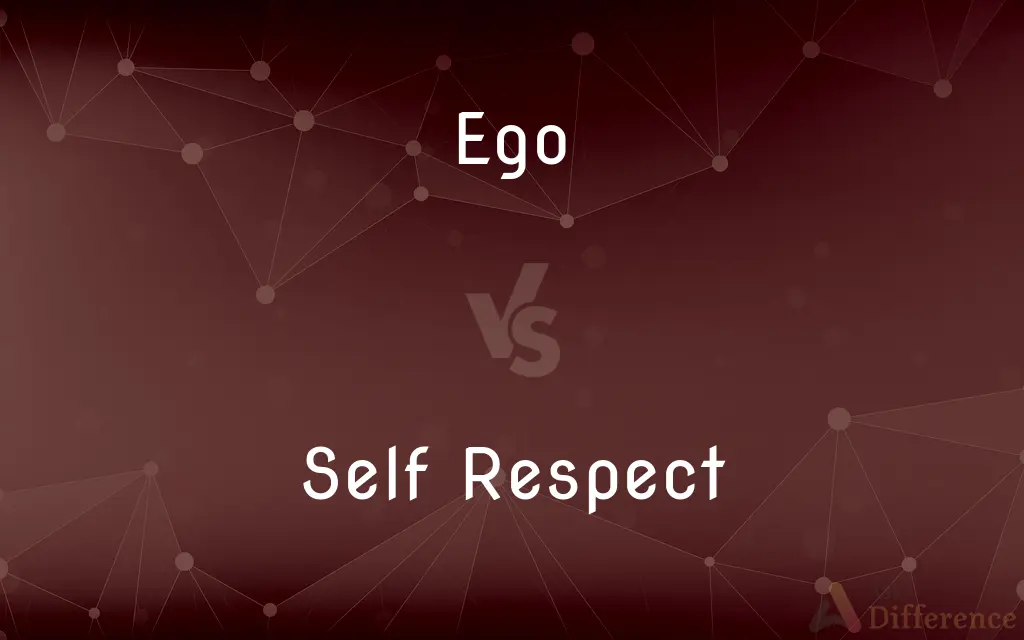Ego vs. Self Respect — What's the Difference?
By Tayyaba Rehman — Published on November 23, 2023
Ego refers to one's sense of self-importance, often excessive, while Self Respect is valuing oneself in a dignified manner.

Difference Between Ego and Self Respect
Table of Contents
ADVERTISEMENT
Key Differences
Ego and Self Respect, although related to one's self-perception, are distinct in nature and influence. Ego is centered around an individual's self-importance, often leading them to put their desires and viewpoints above others. On the other hand, Self Respect pertains to an individual's sense of worth, pushing them to demand respect without demeaning others.
Ego can lead to arrogance and a sense of superiority. This heightened self-worth, when uncontrolled, can make one dismissive of others' feelings and viewpoints. Conversely, Self Respect emphasizes the value one places on themselves, ensuring they aren't mistreated or undervalued but without belittling others.
It's crucial to differentiate between these concepts because an inflated Ego can strain interpersonal relationships, leading to conflicts. In contrast, Self Respect fosters self-love, ensuring that one's boundaries are respected. Self Respect, therefore, cultivates positive self-esteem without the pitfalls of egocentrism.
At its core, Ego seeks validation and superiority, often resulting in defensive behaviors when challenged. Self Respect, in its essence, is the foundation of self-worth, teaching individuals to respect themselves and, in turn, respect others. Balancing Ego and Self Respect is integral to nurturing healthy self-perception and interpersonal relationships.
Comparison Chart
Rooted in
Self-importance, superiority.
Valuing oneself, maintaining dignity.
ADVERTISEMENT
Manifestation
Arrogance, dismissiveness.
Confidence, ensuring one isn't mistreated.
Effects on Relationships
Can lead to conflicts, strained relationships.
Promotes mutual respect and understanding.
Seeking
Validation, recognition.
Dignity, self-worth.
Impact on Self-Perception
Can lead to defensiveness, egocentrism.
Strengthens positive self-esteem and self-worth.
Compare with Definitions
Ego
Ego is the consciousness of self-importance.
His Ego wouldn't let him admit he was wrong.
Self Respect
Self Respect fosters self-love.
Her Self Respect prevented her from settling for less.
Ego
Ego can overshadow empathy.
Due to his Ego, he couldn't see her perspective.
Self Respect
Self Respect operates without seeking superiority.
Even in disagreement, he maintained his Self Respect.
Ego
Ego pushes one to be superior.
His Ego made him competitive in all situations.
Self Respect
Self Respect guards one's dignity.
Her Self Respect ensured she wasn't taken for granted.
Ego
Ego seeks external validation.
Her Ego was boosted by the applause.
Self Respect
Self Respect demands respect without demeaning others.
With Self Respect, he communicated his boundaries.
Ego
The self, especially as distinct from the world and other selves.
Self Respect
Self Respect emphasizes self-worth.
She left the job because it compromised her Self Respect.
Ego
In psychoanalytic theory, the division of the psyche that is conscious, is responsible for our feelings of selfhood, and most directly interacts with external reality.
Self Respect
Due respect for oneself, one's character, and one's conduct.
Ego
An exaggerated sense of self-importance; conceit.
Self Respect
The knowledge of one's own worth, valuing one's self; pride.
Ego
Appropriate pride in oneself; self-esteem.
Self Respect
Respect for one's self; regard for one's character; laudable self-esteem.
Ego
The self, especially with a sense of self-importance.
Self Respect
The quality of being worthy of esteem or respect;
It was beneath his dignity to cheat
Showed his true dignity when under pressure
Ego
The most central part of the mind, which mediates with one's surroundings.
Ego
The conscious and permanent subject of all psychical experiences, whether held to be directly known or the product of reflective thought; the subject consciously considered as "I" by a person; - opposed to non-ego.
Ego
That one of the three parts of a person's psychic apparatus that mediates consciously between the drives of the id and the realities of the external physical and social environment, by integrating perceptions of the external world and organizing the reactions to it. Contrasted with the id and superego.
Ego
Egotism; as, a job requiring a diplomat without too much ego.
Ego
Self-esteem; as, he has an overinflated ego.
Ego
An inflated feeling of pride in your superiority to others
Ego
Your consciousness of your own identity
Ego
(psychoanalysis) the conscious mind
Ego
Ego often manifests as pride or arrogance.
His Ego prevented him from apologizing.
Common Curiosities
Is Self Respect linked to confidence?
Yes, Self Respect is closely tied to confidence and valuing oneself.
Can Ego cause conflicts?
Yes, an unchecked Ego can lead to misunderstandings and conflicts.
Can Self Respect lead to positive relationships?
Yes, Self Respect often fosters mutual respect, leading to healthier relationships.
Is an inflated Ego harmful?
An excessively inflated Ego can strain relationships and hinder personal growth.
Does Self Respect influence decision-making?
Yes, Self Respect can guide decisions that align with one's values and self-worth.
Does Self Respect mean one shouldn't compromise?
Self Respect means not compromising one's dignity and values, but healthy compromises are part of relationships.
Can one have both Ego and Self Respect?
Yes, it's possible to have both, but a balance is essential for healthy self-perception.
Is Ego always negative?
While Ego can lead to negative behaviors, a healthy Ego is necessary for self-awareness and motivation.
Is Ego linked to self-esteem?
Ego is related to self-esteem but is more about self-importance, while self-esteem is about self-worth.
Can Ego be controlled?
With self-awareness and introspection, one can manage and balance their Ego.
Share Your Discovery

Previous Comparison
Controversy vs. Scandal
Next Comparison
Chrysocolla vs. TurquoiseAuthor Spotlight
Written by
Tayyaba RehmanTayyaba Rehman is a distinguished writer, currently serving as a primary contributor to askdifference.com. As a researcher in semantics and etymology, Tayyaba's passion for the complexity of languages and their distinctions has found a perfect home on the platform. Tayyaba delves into the intricacies of language, distinguishing between commonly confused words and phrases, thereby providing clarity for readers worldwide.












































